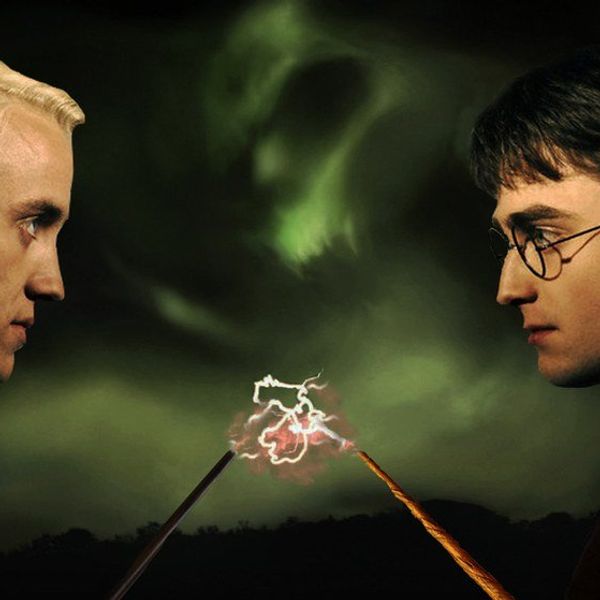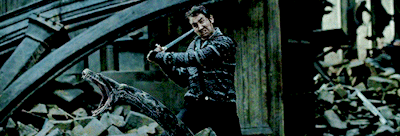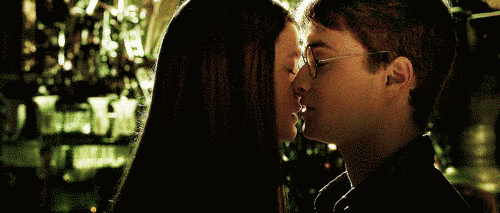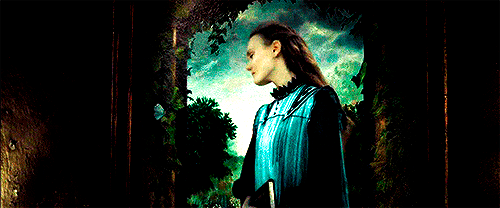If I were to say that I love Harry Potter, it would completely underestimate my obsession. I’ve read the books countless times (mostly because I was to embarrassed to keep count over 30), and one of the most serious forms of punishment I received when I was a kid was when my mom threatened to take away my Harry Potter books. I am an avid Harry Potter fan, and I obviously love the movies too.
There’s nothing better than seeing your favorite series come to life, but as with any book-to-film adaptation, there are some oversights and mistakes. While I am rational enough to know that it was impossible to fit every detail of the books into the movies, here are the top 20 differences between books and movies that annoy me most.
1. Peeves the poltergeist.
Peeves was prevalent in every book, and the troublemaker never made it easy for students, teachers and especially the caretaker, Argus Filch. Peeves' constant interference was inspirational, to say the least. Peeves showed blatant disregard for the students and teachers of Hogwarts, with the exceptions of Dumbledore, the Bloody Baron and the Weasley twins. His best moments were when he saluted Fred and George after they had their fun with Umbridge, and the creative poem he sung after the end of the Battle of Hogwarts.
2. Hermione’s potion challenge.
At the end of the first book, the golden trio attempt to make it through three obstacles intended to protect the Sorcerer’s Stone. Both Ron and Harry have a particular challenge that highlight their characteristics (the chess game and the Mirror of Erised, respectively), but in removing this third challenge from the movie, we don’t get to see how Hermione’s bravery and intelligence come together.
3. James Potter’s backstory.
We get very little information about James Potter in the movies, other than the occasional mention from Sirius and the notorious bullying scene with Snape. The information that the movies chose to show makes him seem like a terrible person, but his portrayal in the books is completely different. When Harry begins to question his father's character, Remus and Sirius are there to reassure Harry that James was a good person.
4. The Marauders.
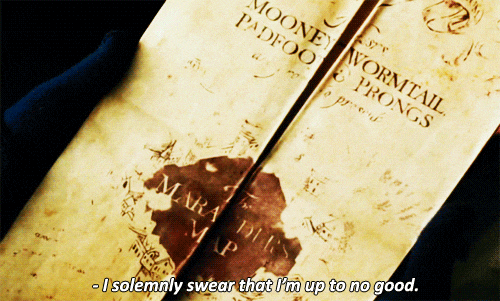
5. The Deathday Party.

6. Rita Skeeter's secret.
Rita Skeeter was the journalist that everyone loved to hate, but the movies never really show how she gathered the information for her destructive stories. She wrote an article revealing that Hagrid was part giant, and she was able to sneak around because she was an unregistered animagus. She could transform into a beatle, allowing her to spy on the subjects of her stories.
7. Dobby.

8. Winky.
Winky, a house-elf that formerly belonged to the Crouch family, is another loss to the movie adaptation. If you were ever confused why the Wizarding World made such an uproar when Sirius Black escaped prison, but there was no mention of Barty Crouch Jr.’s escape, Winky is the missing link. Barty Crouch and his wife helped their son to escape, and Winky was left with the responsibility of taking care of him. When Barty Jr. escaped to rejoin "You-Know-Who," Winky was fired and began working at Hogwarts.
9. Kreacher.
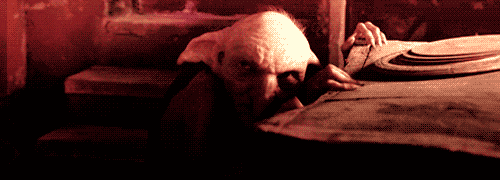
10. The prophecy.
When Harry finds out about the prophecy regarding Voldemort and himself, we're all a little confused. The books cut out a lot of the informational aspects of "Harry Potter and the Order of the phoenix" and "Harry Potter and the Half-Blood Prince," so there isn't a lot of background information about the somewhat confusing prophecy. Considering that it's one of the more important plot points, I think the films should have spent more time explaining the prophecy.
11. Neville’s importance to the plot.
Neville plays an important role in the movies. He's always there to help Harry, and he destroys Nagini and the Horcrux within her. However, Neville is much more relevant than he seems. The aforementioned prophecy applied to a child who was born at the end of July and whose parents had defied Voldemort three times. Although Voldemort chose Harry, this prophecy applied to anoter child: Neville Longbottom. Neville could have just as easily been the main character of this series, and the movies don't emphasize the importance of Voldemort's choice. However, Voldemort instead chose to eliminate the threat of the Longbottoms by sending Death Eaters to torture Neville's parents mercilessly, until they lost all sanity.
12. The Dursleys' final goodbye.
Throughout the entire book series (and movies), the Dursleys are terrible to Harry. They blame him for everything and shun his magical ability, so it's not surprising that they are widely disliked. However, the movies skipped over Dudley's one moment of redemption. After years of tormenting Harry, Dudley shows some sign of remorse when he shakes Harry's hand and says goodbye.
13. Ginny and Harry’s relationship.
Harry and Ginny had no chemistry on screen, and the movie does a pretty bad job of leading up to their relationship. Ginny's fiery spirit is a perfect match for Harry. The fact that Harry likes Ginny is subtly hinted at throughout a couple of the books, culminating in their relationship at the end of "Harry Potter and the Half-Blood Prince." Harry breaks up with Ginny to protect her while he goes hunting for Horcruxes, but of course they get back together. The only time the movie really hints at their relationship is that awkward kiss in the Room of Requirement, and it's not an accurate representation of their relationship at all.
14. Peter Pettigrew’s demise.
In "Harry Potter and the Prisoner of Azkaban," Harry makes the decision to save Peter Pettigrew’s life, against the wishes of Remus and Sirius. Dumbledore tells Harry that Pettigrew now owes Harry his life. The movie never shows the relevance of this moment, but in the book, when Pettigrew goes to the chamber where Harry and Ron are being kept by the Malfoys, the deed comes full circle. After struggling and losing his wand to Ron, Pettigrew’s silver hand, which was gifted to him by Voldemort, betrays him and strangles Pettigrew.
15. Dumbledore’s backstory.
In the last movie, Harry begins to learn about Dumbledore's past, but it goes much deeper in the books. We learn about Dumbledore's family, the death of his sister Ariana and his relationship with Grindelwald. Learning more about Dumbledore definitely changed my perspective on his character, and it gives you a better idea of what Dumbledore really sees in the Mirror of Erised.
16. Voldemort’s history.
In the books, there is a much larger focus on Harry learning about Voldemort's past. Dumbledore shows Harry a series of memories in order to prepare him for his quest to destroy the Horcruxes, but the movie only shows a few of these. We don't get to see Voldemort's family history, in which we learn that Voldemort's mother gives his muggle father a love potion. The lack of love in Voldemort's past is influential in his future villainy, but the movies completely skip over this information.
17. The Battle of the Astronomy Tower.
In "Harry Potter and the Half-Blood Prince," Draco approaches Dumbledore on the Astronomy Tower, intending to kill him. Draco uses the vanishing cabinet in the Room of Requirement to penetrate the Hogwarts' defenses. However, in the movie, after all the Death Eaters congregate in the tower and Snape kills Dumbledore, they just leave. In the book, there is a battle fought between the Order of the Phoenix, Dumbledore's Army and the Death Eaters.
18. S.P.E.W.
Hermione is an intelligent, fierce, badass witch but she's also an activist. She started the Society for the Promotion of Elfish Welfare (S.P.E.W.) to help increase better treatment of house-elves, despite the movement's lack of popularity. She knits socks and hats for the house-elves. Even though Dobby winds up keeping all of them, it's endearing to see Hermione so passionate about her cause. Similarly, when Hermione and Ron kiss in the last book, it's after Ron shows an interest in the well-being of the house-elves.
19. Voldemort's death.

Voldemort spends the entire series desperately trying to avoid death—his name literally means "Flight of Death." At the end of the book, Harry and Voldemort are in a standoff, and Harry explains to Voldemort why he's been wrong all along. Harry sets out to prove that Voldemort has to face death eventually because he is no different than anyone else. In the movies, Voldemort slowly disintegrates when he is hit with the killing curse, undermining his humanity.
20. “Harry did you put your name in the Goblet Of Fire!?”
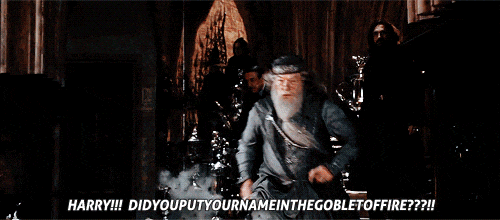
There are a lot of disparities not mentioned in this list (such as the mirror Sirius gave Harry, Dumbledore's funeral, the final duel between Harry and Voldemort and the explanation of the wand cores), but some things have to get lost in the transition from book to movie. Although I'm disappointed some of my favorite moments from the books didn't make it to the movies, it won't stop me from having regular Harry Potter movie marathons.


